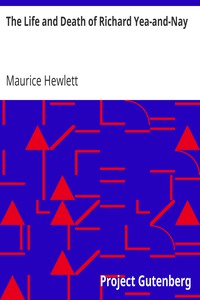The Life and Death of Richard Yea-and-Nay by Maurice Hewlett (digital ebook reader .txt) 📗

- Author: Maurice Hewlett
Book online «The Life and Death of Richard Yea-and-Nay by Maurice Hewlett (digital ebook reader .txt) 📗». Author Maurice Hewlett
Not all of King Richard was buried there, where the great effigy still marks the place of great dust. Jehane had his heart in a casket, and with Fulke her son, Des Barres, her brother Saint-Pol, Gaston of Béarn, and the Abbot Milo, took it to the church of Rouen and saw it laid among the dead Dukes of Normandy; fitting sepulture for a heart as bold as any of theirs, and capable of more gentle music when the fine hand plucked the chords. After this Jehane kissed Fulke and left him with the Queen, his uncle, and Guilhem des Barres. Then she went back to her ship.
In the white palace in the green valley of Lebanon the Old Man of Musse embraced his wife. 'Moon of my soul, my Garden, my Treasure-house!' he called her, and kissed her all over.
'The King died in peace, my lord,' she said, 'and I have peace because of that.'
'Thy children shall call thee blessed, my beloved, as I call thee.'
'The prophecy of the leper was not fulfilled, sir,' says Jehane.
Ah,' replied the Old Man of Musse, all these things are in the hands of the Supreme Disposer, Who with His forefinger points us the determined road.'
Then Jehane went in to her children, and other duties which her station required of her.
EPILOGUE OF THE ABBOT MILO'When I consider,' writes the Abbot Milo on his last page, 'that I have lived to see the deaths of three Kings of England, wearers of the broom-switch, and of the manner of those deaths, I am led to admire the wonderful ordering of Almighty God, Who accorded to each of them an end illustrative of his doings in the world, and so wrote, as it were, in blood for our learning. King Henry produced strife, King Richard induced strife, and King John deduced it. King Henry died cursing and accursed; King Richard forgiving and forgiven; King John blaspheming, and not held worthy of reproof. The first did evil, meaning evilly; the second evil, meaning well; the third was evil. So the first was wretched in death, the second pitiful, the third shameful. The first loved a few, the second loved one, the third none. So the death of the first was gain to a few, that of the second to one, that of the third to none; for he that loves not, neither can he hate: he is negligible in the end. But observe now, the chief woe of these kings of the House of Anjou was that they hurt whom they loved more than whom they hated.
'King Henry was a great prince, who did evil to many both in his life and death. My dear master, lord, and friend might have been a greater, had not his head gone counter to his heart, his generosity not been tripped up by his pride. So generous as he was, all the world might have loved him, as one loved him; and yet so arrogant of mind that the very largess he bestowed had a sting beneath it, as though he scorned to give less to creatures that lacked so much. All his faults and most of his griefs sprang from this rending apart of his nature. His heart cried Yea! to a noble motion. Then came his haughty head to suggest trickery, and bid him say Nay! to the heart's urgency.
'He was a religious man, a pious man, the hottest fighter with the coolest judgment of any I have ever known; a great lover of one woman. He might have been a happy man if she had been let have her way. But he thwarted her, he played with her whole-heart love, blew hot and cold; neither let her alone nor clove to her through all. So she had to pay. And of him, my friend and king howsoever, I say from the bottom of my soul, if his death did not benefit poor Jehane, then it is a happy thing for a woman to go bleeding in the side. But I know that she was fortunate in his death, and believe that he was also. For he had space for reparation, died with his lovers about him, having been saved in time from a great disgrace. And it is a very wise man who reports: Illi Mors gravis incubat, qui notus nimis omnibus, ignotus moritur sibi. But King Richard knew himself in those last keen hours, and (as we believe) won forgiveness of God.
'God be good to him where he is! They say that when he died, that same day his soul was solved from purgatorial fires (by reason, one may suppose, of his glorious captaincy of the armies of the Cross), and he drawn up to heaven in a flamy cloud. I know nothing certainly of this, which was not revealed to me; but my prayer is that he may be now with Hannibal and Judas Maccabæus and Charles the great Emperor; and by this time of writing (if there be no offence in it) with Jehane to sit upon his knee.





Comments (0)